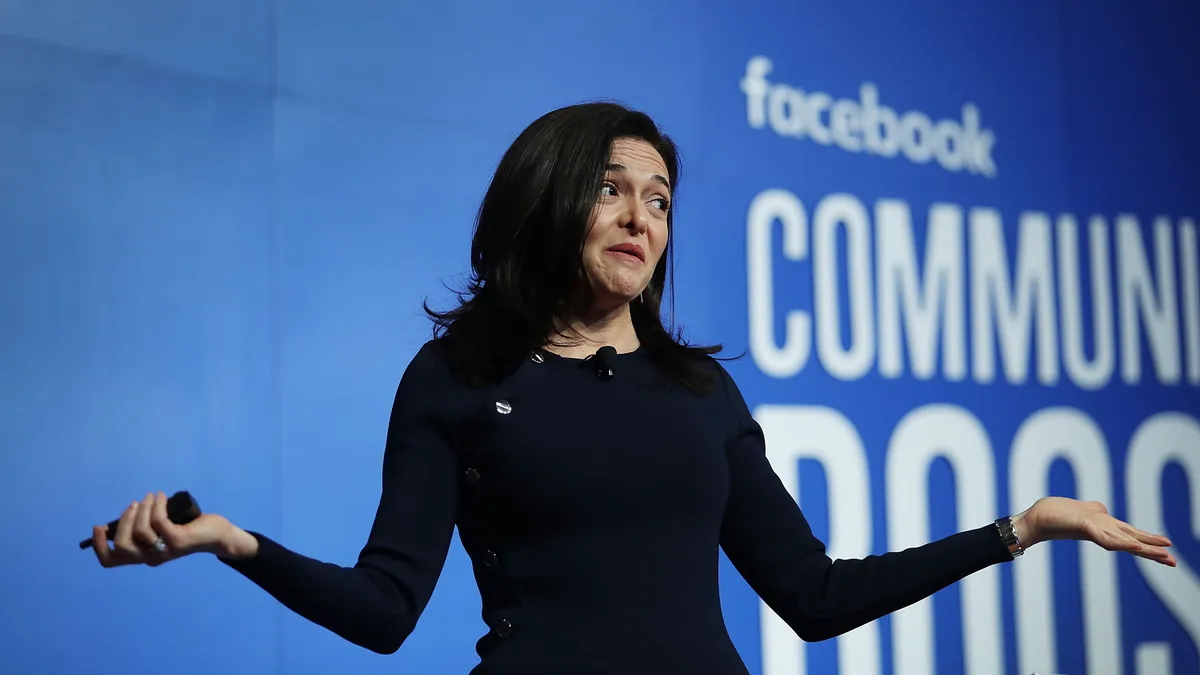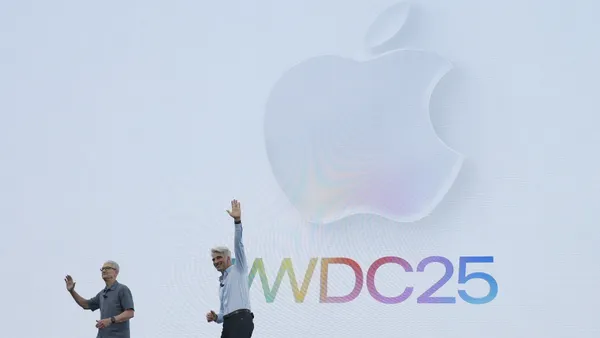Dive Brief:
- Sheryl Sandberg announced in a Facebook post that she is stepping down as chief operating officer of Meta Platforms, ending a 14-year run that has been integral to shaping one of the most powerful and controversial forces in digital advertising. Sandberg will remain on the board of Meta.
- Sandberg’s laser focus on scaling an ad ecosystem, including through the offering of self-service and personalization features, propelled the firm to new heights and eventually set the model for the wider social media landscape.
- Her departure comes as Meta is in the middle of years-long process to remake its ads business in recognition of a more privacy-oriented world and as revenue growth continues to cool following a run of meteoric gains. Chief Growth Officer Javier Olivan will step up as COO, per a separate blog post.
Dive Insight:
Sandberg’s departure marks an end of an era for Meta, which has struggled to find its footing as its core business drivers and public reputation attempt to recover from repeated pummelings. In the personal post announcing her resignation, Sandberg said she’s unsure of her next moves outside of spending more time on philanthropic work and with Lean In Foundation, an organization she started to support women in the workplace.
It’s hard to overstate the impact the executive had in shaping Meta into the digital behemoth it is today. When she first joined the company, then just known as Facebook, in 2008, Sandberg had vital experience from her previous role helping oversee ads at Google. Facebook at the time was increasingly popular with users but comparatively immature. Sandberg brought over essential digital advertising know-how that a fledgling Facebook lacked, even as it molded the pillars of the social media economy. Meta co-founder and CEO Mark Zuckerberg was just 23 at the time of their first meeting, and much more oriented around product versus financials.
"Sheryl Sandberg had an enormous impact on Facebook, Meta, and the broader business world,” said Insider Intelligence's Principal Analyst Debra Aho Williamson in emailed comments. “She helped Facebook build a world-class ad-buying platform and develop groundbreaking ad formats, which enabled the company to become the second largest digital ad business in the world behind Google.”
However, Facebook’s public-image problems have piled up amid closer scrutiny placed on the spread of misinformation and hate speech online, while the ad infrastructure Sandberg carefully crafted has been upended by shifting policies around data privacy.
It's difficult to separate the quest for scale Sandberg helped spearhead from the myriad problems that would follow as Facebook’s outsized online presence led to misinformation and hate-speech campaigns, along with notable data-privacy scandals like the Cambridge Analytica breach in 2018 — a fiasco that inspired more stringent regulations that have come back to haunt Meta.
As the “move fast, break things” mentality of Facebook soured from a disruptive business mantra into something potentially sinister, Sandberg also received more flak for appearing to downplay the company’s influence on events like the U.S. Capitol Riots in 2021.
In a separate blog post, Zuckerberg said Chief Growth Officer Javier Olivan will step up as COO, though the position is being adjusted. The chief executive nodded to a desire to more closely integrate the product and business sides of the company. Zuckerberg said Olivan will serve as a “more traditional COO” centered on internal operations and efficiency. Sandberg juggled a number of tasks as COO, including ones related to policy that occasionally landed her in hot water.
“The company needs to find a new way forward, and perhaps this was the best time for Sandberg to depart,” said Williamson.
Olivan and the rest of the Meta ads team have to fill some tall orders. Meta’s ability to target and measure mobile campaigns has been seriously hamstrung by iOS changes Apple introduced last year that make user-tracking more difficult. There is no easy short-term solution to dealing with the iPhone maker’s App Tracking Transparency Framework, which has weighed on Meta revenue in recent quarters.
“We have to rebuild our targeting and optimization systems to work with less data,” Sandberg told analysts on an earnings call in October. “This is a multiyear effort.”
The core big blue Facebook app has recently encountered struggles to add new users for the first time. And Meta’s attempts at designing the next chapter of the internet in the metaverse carry steep costs and a long road ahead in signing on users who are increasingly flocking to rival apps.
“Sheryl Sandberg’s departure comes at a time when Meta is at a crossroads,” said Forrester Vice President and Research Director Mike Proulx in an email. “As the company doubles down on short-form video to try to compete with TikTok and slowly pivots its core offering towards the 'metaverse,' it’s important to recognize that what got Facebook to where it is won’t necessarily get Meta to where it needs to be. This means that headwinds are abound for the company, at least in the short-term.”
Meta's ad revenue grew 6% year-on-year to $27 billion in the first quarter of 2022. Daily active users on the core Facebook app were up 4%, or by 82 million, to 1.96 billion.














